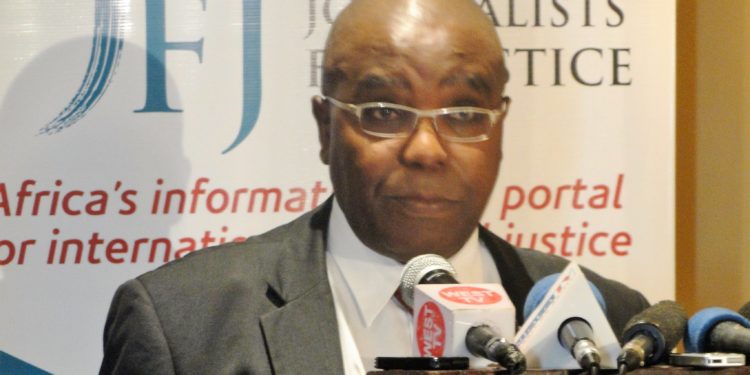Wilfred Nderitu, theCommon Legal Representative for the Victims in the William Ruto and Joshua Sang cases has revealed that he has filed a confidential motion at the ICC.
Although he did not disclose the contents of the motion, he said that its objective was to raise the victims’ visibility.
Nderitu challenged the media to engage with the victims more than they have done.
“The press has leant towards the defence because they want to make news. If they want to make news, sometimes it is felt the victims are not newsworthy,” he added, while addressing the monthly Journalists for Justice media briefing in Nairobi.
“The press needs to look at the wider aspects of the case, give the victims a better hearing because they do not have the same kind of resources that can be applied by the defence to make them visible. At the bottom of a criminal trial, there are hundreds of thousands of people that have suffered harm and continue to suffer harm now going into 9 years after the 2007/2008 Kenya Post-Election Violence,” he added.
Read: We cannot speculate the outcome of the No-Case-to-answer matter in the Ruto and Sang cases, says Maria Kamara
What then for victims?
Nderitu explained that if the Trial Chamber rules that there is no case to answer, it would mean the form of assistance that might be advanced through the Trust Fund For Victims.
“The assistance would be minimal and perhaps not guaranteed. This is because reparations as opposed to assistance can only be ordered against a convicted person. There would be no reparations if there is no case to answer.”
However, he was of the opinion that under common law tradition, the no-case-to-answer decision would be appealable.
“But if there is a case to answer, the decision is not appealable, but others are of a different opinion,” says Nderitu.
“The interests of victims are not all about assistance. There are other things in the scenario for instance, the establishment of the truth and protection of the victims,” he added.
“Until the case is finally over, the victims would still have guaranteed rights to express their views and concerns as long as their personal interests are affected.”
He also urged the public not to engage in a conspiracy of silence but to keep on voicing the concerns of the victims.
“When victims continue to hurt and to experience harm and remain destitute, we must continue to shout out loud. We must not lose hope. What the ICC has done since the trial begun, that is what the Kenyan state has not done since 1992,” he affirmed.



-75x75.jpg)



